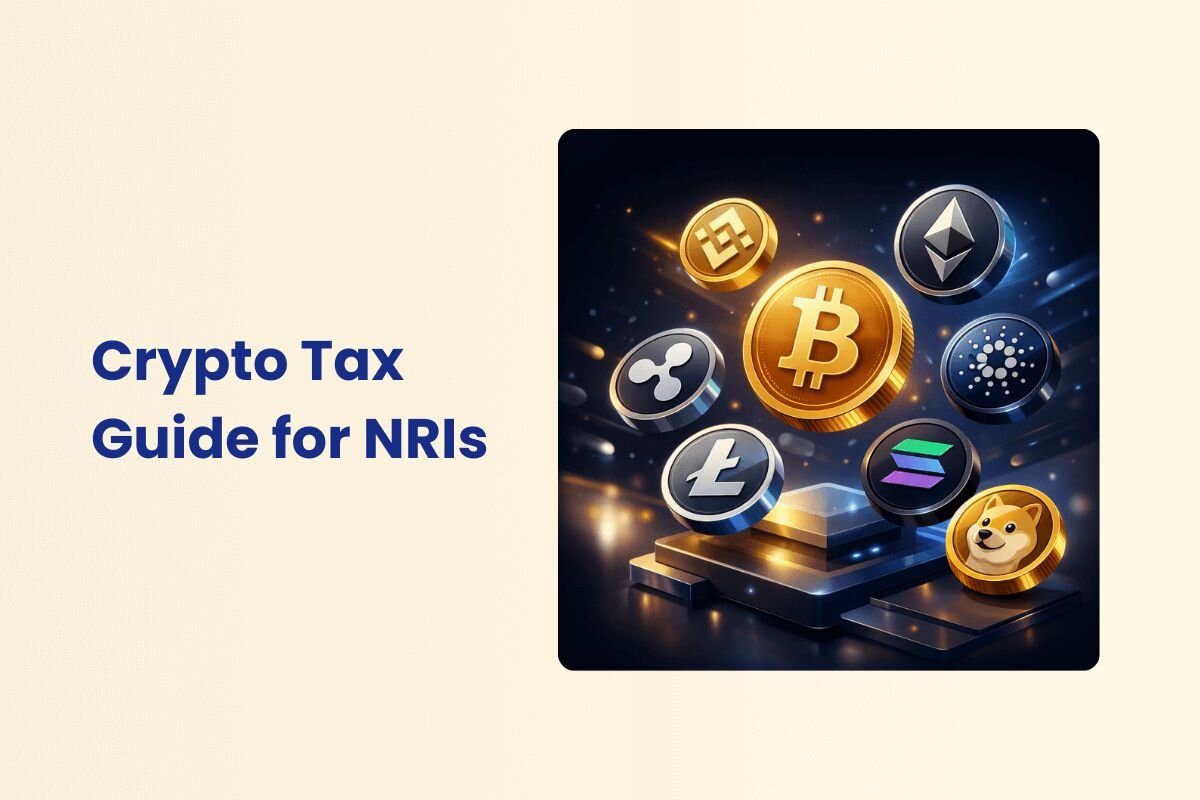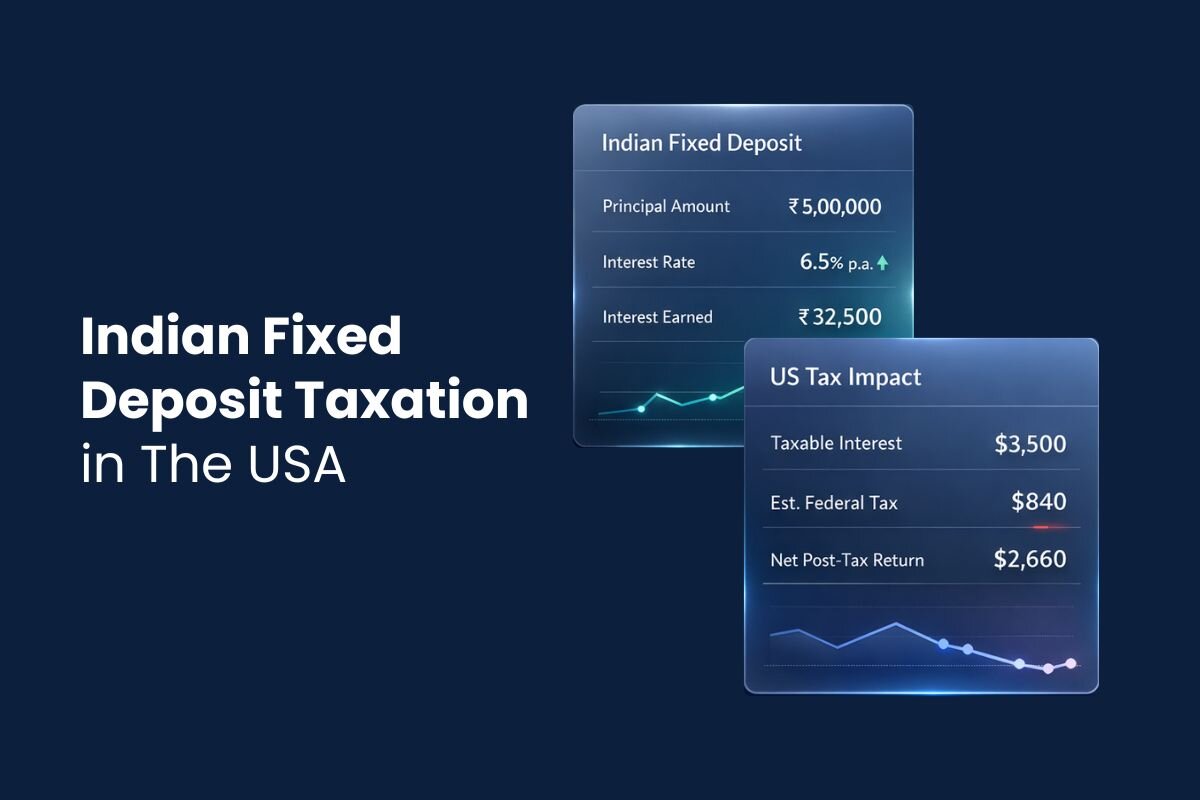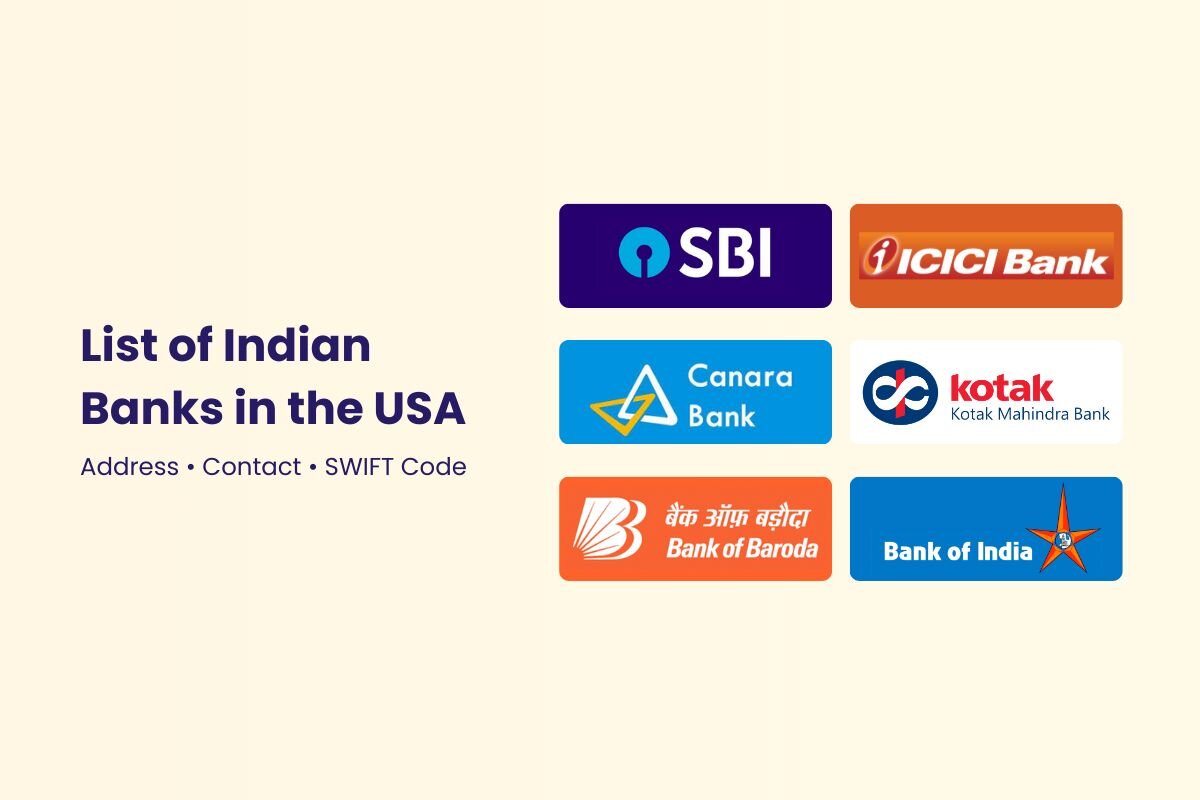As an NRI, India offers you more than just a homecoming - it offers some of the world’s most rewarding investment opportunities.
From safe bets like FDs and government bonds to high-growth options like equities, REITs, and fractional real estate, the choices in 2025 are wider and smarter than ever.
This guide breaks down 15 investment plans for nri, their returns, tax rules, and compliance so you can grow wealth in India while living abroad.
Key Takeaway
Managing money as an NRI is about balancing safety, growth, and tax efficiency - and India offers plenty of opportunities if you know the rules.
- Wide Range of Options: From safe FDs and bonds to high-growth equities, REITs, and startups.
- Banking Foundation: Investments must go through NRE, NRO, or FCNR accounts under FEMA.
- Real Estate Made Easy: Earn 7–10% from property, or invest in REITs/fractional ownership with lower entry costs.
- Retirement & Long-Term Wealth: NPS, PPF, and ULIPs build secure retirement savings with tax perks.
- Gold Still Shines: SGBs, ETFs, and digital gold combine tradition with smart investing.
- Tax Efficiency: NRE/FCNR FD interest is tax-free, while DTAA reduces double taxation.
- Essential Documentation: PAN, overseas address proof, passport, and TRC are often mandatory.
- Winning Strategy: Diversify across asset classes for steady returns in 2025 and beyond.
1. Direct Equity (Stocks, ETFs)
Direct equity puts you in the driver's seat of India's economic growth story.
This investment avenue gives you direct ownership in Indian companies through shares and ETFs - no intermediaries, just pure exposure to market movements.
What is Direct Equity?
Direct equity means purchasing shares of individual companies listed on NSE and BSE. Exchange Traded Funds (ETFs) offer another route by combining stock and mutual fund features.
ETFs invest across shares, bonds, and money market instruments, making them accessible even if you lack extensive stock market knowledge.
Why it's good for NRIs
Indian stocks deliver higher return potential compared to most other investment channels. The market spans diverse sectors - from established giants to emerging industry players.
ETFs automatically diversify your holdings across companies and sectors without requiring individual stock picks.
High liquidity stands out as another key advantage. You can enter or exit positions seamlessly without time zone coordination challenges.
Investments through NRE accounts offer complete repatriation of proceeds.
How to invest in Equity
Your investment setup requires:
- Portfolio Investment NRI Scheme (PINS) account through an authorized dealer bank
- Demat account for electronic securities holding
- Trading account linked to your demat account
RBI's recent simplification eliminates the need for separate NRO PINS accounts - just the NRE PINS account suffices. NRIs can only execute delivery-based transactions in equity shares; intraday trading remains prohibited. Your investment is capped at 10% of any Indian company's paid-up capital.
Taxation & Compliance
Capital gains classification follows clear rules:
- Short-term (under 12 months): 15% tax
- Long-term (over 12 months): 10% tax on gains exceeding ₹1 lakh
TDS applies on capital gains - 10% for equity-related gains and 20% for non-equity investments.
Double Taxation Avoidance Agreements (DTAA) between your resident country and India prevent dual taxation on your investments.
2. Mutual Funds
Mutual funds stand out as one of the most practical investment vehicles for NRIs who want professional management without the complexity of direct stock selection.
Your money gets pooled with other investors, creating access to diversified portfolios that would be difficult to build individually.
What are Mutual Funds?
Mutual funds collect money from multiple investors to build diversified portfolios of stocks, bonds, or other securities.
You have two investment approaches: Systematic Investment Plans (SIPs) let you invest fixed amounts monthly or quarterly, while lumpsum investments involve committing a large amount in one transaction.
Professional fund managers handle the investment decisions, bringing expertise that's particularly valuable when you're managing investments from abroad.
Why it's good for NRIs
The advantages are clear for non-resident investors:
- Expert Management: Fund managers handle day-to-day decisions while you focus on your overseas commitments
- Cost Averaging: SIPs automatically buy more units when prices drop and fewer when they rise, smoothing out market volatility
- Instant Diversification: Get exposure to multiple sectors and asset classes without researching individual companies
- Currency Benefits: Rupee appreciation can add extra returns to your investment gains
- Complete Flexibility: Modify, pause, or exit investments without penalties or restrictions
How to invest in MFs
Start with the mandatory KYC process required by SEBI. You'll need:
- Passport
- PAN card
- Overseas address proof
- Bank statement
- FATCA declaration
Open an NRE account for overseas earnings or NRO account for Indian income.
Once your accounts are ready, you can invest through AMC websites, registrar platforms, mutual fund utilities, or stock exchange facilities.
Taxation & Compliance
Tax treatment depends on the fund type and holding period. Equity mutual funds face 15% tax on short-term gains (under 12 months) and 12.5% on long-term gains exceeding ₹1.25 lakh.
Debt funds see short-term gains taxed per your income slab, while long-term gains face 12.5% tax without indexation.
TDS applies at redemption - 10% for equity-related gains and 20% for non-equity investments.
Double Taxation Avoidance Agreements between India and your country of residence prevent paying taxes twice on the same income.
3. Debt Mutual Funds
Debt mutual funds deliver stable returns for NRIs seeking lower-risk investment vehicles in India. These funds provide a balanced approach to wealth creation while keeping risk manageable.
What are Debt Funds?
Debt funds are mutual funds that invest in fixed-income securities—treasury bills, corporate bonds, government securities, and money market instruments. These investments generate interest at fixed rates during your investment period. Fund managers pick securities based on credit ratings and adjust strategies with interest rate movements—choosing long-term securities when rates fall and short-term instruments when rates climb.
Why it's good for NRIs
Debt funds offer specific advantages for overseas investors:
- Better Returns: Often beat traditional fixed deposits after taxes
- High Liquidity: Redeem units anytime with funds reaching your account within a day
- Flexible Investment: Pick between SIP or lumpsum methods
- Partial Withdrawals: Access portions of your investment for urgent needs without touching the entire amount
- Portfolio Safety: Acts as a cushion to reduce overall portfolio risk
How to invest in Debt Funds
Open an NRE (Non-Resident External) or NRO (Non-Resident Ordinary) account first. Complete the KYC process with your passport, PAN card, overseas address proof, and FATCA declaration. You can start investing through AMC websites or their appointed representatives in India once verification is done.
Taxation & Compliance
Tax treatment depends on when you bought the funds, thanks to the Finance Act 2023:
Debt funds purchased before April 1, 2023, and sold after July 22, 2024: long-term gains (held over 24 months) face 12.5% tax without indexation, while short-term gains follow your income tax slab. Funds purchased on or after April 1, 2023: all gains are taxed at your income tax slab rate regardless of how long you hold them.
TDS gets deducted at 30% on redemption from debt mutual funds. India's Double Taxation Avoidance Agreements with over 90 countries ensure you pay tax only once.
4. Fixed Deposits (NRE/NRO/FCNR)
Fixed deposits deliver predictable returns with the security you need for your Indian investment portfolio. Think of them as your financial safety net - reliable, straightforward, and designed specifically for NRIs seeking steady growth without market volatility.
What are NRI FDs?
You can choose from three distinct fixed deposit types in India:
- NRE (Non-Resident External) Fixed Deposits: Your foreign earnings find a home in these rupee-denominated accounts with tenures spanning 1-10 years. Maintain funds for at least one year to earn interest.
- NRO (Non-Resident Ordinary) Fixed Deposits: Perfect for your Indian income sources like rent, dividends, or pension. These require just 7 days minimum to start earning interest.
- FCNR (Foreign Currency Non-Resident) Deposits: Hold your money in six major currencies including US Dollars, Pounds Sterling, Euro, Japanese Yen, Australian Dollars, and Canadian Dollars with 1-5 year tenures.
Why it's good for NRIs
FDs offer guaranteed returns without the guesswork of market fluctuations. Your benefits extend beyond simple interest:
- Predetermined returns eliminate investment uncertainty
- Joint holdings available with other NRIs or resident Indians
- Overdraft facilities up to 90% of your deposit amount
- Complete repatriation rights for NRE and FCNR deposits
- Tenure flexibility aligned with your financial timeline
How to invest in FDs
The process works seamlessly across multiple channels:
- Online applications through bank websites
- Bank callback requests for personal assistance
- Branch visits during your India trips
- Internet banking if you already maintain NRE/NRO accounts
Documentation includes passport copies, valid work/residence permits, and address proofs for both Indian and overseas locations.
Taxation & Compliance
Tax treatment depends on your deposit type:
- NRE and FCNR deposits: Interest remains completely tax-exempt in India
- NRO deposits: Subject to 30% TDS plus applicable surcharge and cess
Double Taxation Avoidance Agreements (DTAA) between your country and India can reduce TDS rates when you provide a Tax Residency Certificate.
5. Real Estate (Residential & Commercial)
Real estate gives you something mutual funds and stocks cannot - a tangible asset in your home country. This investment avenue creates both emotional connection and financial returns, making it particularly appealing for NRIs planning their future in India.
What is Real Estate Investment?
Real estate investment means owning physical property in India - apartments, villas, houses, office spaces, retail outlets, and commercial buildings. You have flexibility in property types, though restrictions exist.
Agricultural land, plantation properties, and farmhouses remain off-limits unless you inherit them.
Why it's good for NRIs
Property investment in India solves multiple financial challenges for overseas residents:
- Superior Returns: Commercial properties deliver 7-10% annual rental yields, beating most traditional savings options
- Currency Advantage: Today's exchange rate of approximately ₹84 to USD 1 makes property purchases more affordable than ever
- Wealth Growth: Indian property markets demonstrate consistent long-term appreciation
- Future Planning: Nearly two-thirds of NRIs plan to return to India after retirement—property investment becomes practical preparation
- Smart Diversification: Real estate balances your portfolio beyond market-linked investments
How to invest in Property
Property investment follows a structured process:
- Documentation: Prepare your passport, PAN card, OCI/PIO card (if applicable), plus power of attorney if you cannot travel to India
- Fund Transfer: Route all payments through NRE/NRO/FCNR accounts as required by banking regulations
- Property Verification: Confirm clear title, valid approvals, and completion certificates before purchase
- Legal Registration: Complete registration at the sub-registrar's office, either personally or through your authorized representative
Taxation & Compliance
Property investment comes with specific tax obligations:
- Purchase TDS: Properties exceeding ₹50 lakh require 1% TDS deduction from the purchase amount
- Capital Gains: Long-term gains (held over 24 months) face 20% tax with indexation benefits, while short-term gains follow your income tax slab
- Rental Income: Subject to 30% TDS plus surcharge and cess
- Repatriation: You can repatriate sale proceeds up to USD 1 million annually, subject to compliance requirements
- Regulatory Compliance: All transactions must meet FEMA regulations and RBI guidelines
6. National Pension Scheme (NPS)
The National Pension Scheme solves retirement planning challenges for NRIs through structured, market-linked investments.
This government-backed avenue delivers tax advantages alongside long-term wealth creation specifically designed for your retirement goals.
What is NPS?
The National Pension Scheme started as a government-sponsored retirement plan for employees in 2004, then opened to all Indian citizens including NRIs.
Your investment journey happens in two phases - accumulation where you contribute regularly, followed by withdrawal where you access funds at maturity. The Pension Fund Regulatory and Development Authority (PFRDA) manages this voluntary scheme.
Why it's good for NRIs
NPS delivers specific advantages for overseas investors:
- Market-Linked Returns: Equity schemes historically return 12-15% annually, Government Bonds yield 9-10%, and Corporate Bonds provide 8-10%
- Diversified Portfolio: Your funds spread across multiple financial securities for balanced growth
- Investment Control: Choose between Active Choice for hands-on management or Auto Choice for automated allocation based on your risk appetite
- Withdrawal Flexibility: Access 25% of your corpus after three years of contributions
- Repatriation Ease: Funds flow smoothly back to your overseas accounts when invested through NRE accounts
How to invest in NPS
Age requirements are straightforward - you must be between 18-60 years. Note that Persons of Indian Origin (PIOs) and Overseas Citizens of India (OCIs) cannot participate. Essential documents include:
- Subscriber registration form
- Passport copy
- PAN card
- Canceled cheque
- Address proof (if different from passport)
Start with ₹500 at account opening, then maintain minimum annual contributions of ₹6,000.
Taxation & Compliance
Tax benefits under the old regime allow deductions up to ₹1,50,000 under Section 80CCD(1) plus an additional ₹50,000 under Section 80CCD(1B).
At maturity (age 60), withdraw 60% of your corpus tax-free while investing the remaining 40% in annuities. Early exits before 60 require 80% annuity purchase with only 20% available as lump sum.
7. Corporate Bonds & NCDs
Corporate bonds and Non-Convertible Debentures (NCDs) provide fixed-income investment channels for NRIs seeking to diversify their Indian portfolio beyond traditional options.
What are Corporate Bonds?
Corporate bonds are debt instruments issued by private and public companies to raise capital for operations, expansion, or other business needs.
These bonds typically offer higher returns than government bonds yet carry moderate risk. Non-Convertible Debentures (NCDs) are specialized debt instruments that cannot be converted into equity shares of the issuing company.
Why it's good for NRIs
Corporate bonds deliver several advantages for overseas investors. Higher yields compared to government securities make them attractive for income-focused portfolios.
Semi-annual or annual interest payments create steady income streams. These securities trade on stock exchanges, ensuring reasonable liquidity when needed.
The opportunity to invest in India's growing corporate sector provides exposure to economic expansion while maintaining fixed-income characteristics.
How to invest in Bonds
RBI permits NRIs to invest in corporate bonds, though not all bonds accept NRI investments. The investment process requires specific steps:
- Open an NRE/NRO account with an authorized dealer bank
- Establish a demat account for holding securities electronically
- Verify NRI eligibility in the bond's offer document before investing
- Route all investments through proper banking channels for compliance
Taxation & Compliance
Interest earned from corporate bonds faces 20% TDS for NRIs. Capital gains taxation depends significantly on holding periods. Bonds held under 36 months face 30% short-term capital gains tax.
Those held longer enjoy 20% long-term capital gains tax with indexation benefits.
This structure rewards patient investors while ensuring compliance with Indian tax regulations.
8. Government Securities (G-Secs, SDLs)
Government securities offer sovereign-backed stability for NRIs who value security alongside steady returns. These instruments provide the safety net your Indian portfolio needs.
What are Government Bonds?
Government securities are debt instruments issued by central or state governments to fund their operations. Treasury bills (T-bills) come with tenures of 91, 182, and 364 days, while dated securities stretch from 5 to 40 years.
State Development Loans (SDLs) represent bonds issued by individual states for development projects.
Why it's good for NRIs
G-Secs deliver solid advantages for overseas investors:
- Zero Default Risk: Sovereign guarantee makes these virtually risk-free investments
- No Investment Ceiling: The Fully Accessible Route (FAR) removes maximum investment limits for NRIs
- Regular Income: Semi-annual interest payments provide predictable cash flows
- Secondary Market Access: Buy or sell these instruments anytime for liquidity
- Zero Brokerage: The RBI Retail Direct platform charges no commission fees
How to invest in G-Secs
The RBI Retail Direct platform simplifies government securities investment for NRIs:
- Open an NRE/NRO savings account with an Indian bank
- Register on the RBI Retail Direct portal
- Complete KYC verification with required documents
- Link your account with UPI/net banking facility
Taxation & Compliance
Interest from government securities is fully taxable for NRIs. TDS applies at 30% plus applicable surcharge and cess.
Capital gains depend on holding period - bonds held under 36 months face 30% short-term capital gains tax, while longer holdings enjoy 20% long-term capital gains tax with indexation benefits.
9. Gold Investments (ETFs, Digital Gold)
Gold offers NRIs a timeless way to preserve wealth while staying connected to Indian traditions. This precious metal serves as your financial anchor during market uncertainties, providing both cultural significance and portfolio stability.
What is Gold Investment?
Your gold investment options extend well beyond traditional jewelry. Gold Exchange-Traded Funds (ETFs) are mutual fund units traded on stock exchanges that track gold prices, with each unit typically representing one gram of 99.5% pure gold.
Digital gold lets you purchase gold online in denominations as small as ₹1, stored in secure, insured vaults on your behalf. E-gold offers similar benefits but requires smaller denominations starting from just 1 gram.
Why it's good for NRIs
Gold delivers distinct advantages for overseas Indians:
- Inflation Shield: Gold historically preserves wealth when currencies weaken and prices rise
- Portfolio Balance: Gold moves independently from stock markets, stabilizing your overall returns
- Global Liquidity: Easily convertible to cash across international markets
- Storage Freedom: Digital options eliminate physical storage risks and costs
- Cultural Bond: Maintains your connection to Indian traditions while building wealth
How to invest in Gold
Your investment process starts with opening an NRE/NRO account with an authorized Indian bank. For Gold ETFs, you'll need a demat and trading account.
Purchase through Non-PINS accounts only. For digital gold, choose platforms offering secure vault storage.
Gold ETFs require more setup compared to digital gold, which can be purchased without a demat account.
Taxation & Compliance
Tax treatment depends on your holding period. Physical and digital gold held for less than 24 months incur short-term capital gains tax at your income slab rate. Hold longer, and you face 12.5% long-term capital gains tax without indexation.
TDS doesn't apply when you trade Gold ETFs through exchanges, but it applies upon direct redemption from fund houses.
Repatriating funds from NRO accounts is limited to USD 1 million annually, subject to documentation and tax compliance.
10. Alternative Investment Funds (AIFs)
Alternative Investment Funds represent premium investment vehicles for sophisticated NRIs seeking exposure to India's private equity, venture capital, and hedge fund sectors.
These privately pooled funds unlock opportunities beyond conventional investment channels.
What are AIFs?
AIFs operate as SEBI-regulated investment vehicles across three distinct categories:
- Category I - Targets startups, SMEs, infrastructure, and social ventures
- Category II - Encompasses private equity, debt funds, and fund-of-funds
- Category III - Houses hedge funds utilizing complex trading strategies
The minimum investment threshold begins at ₹1 crore, though employees or directors of AIFs qualify for reduced amounts of ₹25 lakh.
Why it's good for NRIs
AIFs deliver distinct advantages for sophisticated investors:
- Access to diverse asset classes unavailable through public markets
- Higher return potential versus traditional investment avenues
- Market volatility immunity through low correlation with stock markets
- Direct participation in India's private markets and emerging growth sectors
How to invest in AIFs
Investment requires a structured approach:
- Establish an NRE/NRO account with an authorized Indian bank
- Complete KYC procedures using PAN card, passport, and overseas address documentation
- Submit FEMA declarations specifically for AIF investments
- Transfer funds from your designated NRE/NRO account to the chosen AIF
Taxation & Compliance
Tax treatment differs based on fund category:
- Category I & II - Pass-through taxation structure (gains taxed at investor level)
- Category III - Fund-level taxation as business income
NRIs face TDS rates of 10-15% on long-term capital gains and approximately 30% on short-term gains.
11. Portfolio Management Services (PMS)
Portfolio Management Services deliver personalized wealth management for high-net-worth NRIs who need expert guidance in India's markets.
This premium investment solution goes beyond standard mutual funds - think of it as having your own dedicated investment team managing your Indian portfolio.
What is PMS?
Portfolio Management Services provide professional investment management where a dedicated portfolio manager builds and oversees your investment portfolio based on your specific goals, risk appetite, and time horizon.
SEBI mandates a minimum investment of ₹50 lakh to open a PMS account. Unlike mutual funds where you own units in a pooled investment, PMS grants you direct ownership of the underlying securities.
Why it's good for NRIs
PMS offers distinct advantages for overseas investors:
- Customized portfolios built around your financial objectives
- Direct security ownership in your demat account
- Expert management by professionals who understand Indian market dynamics
- Operational ease - particularly valuable when managing investments from abroad
- Investment flexibility that exceeds mutual fund constraints
How to invest in PMS
Your investment process involves:
- Opening an NRE/NRO account with an authorized Indian bank
- Completing KYC procedures with passport, visa, address proof, and PAN card
- Setting up trading and demat accounts
- Signing a discretionary or non-discretionary management agreement
Taxation & Compliance
TDS applies to portfolio returns for NRIs, with rates depending on your country of residence. Double Taxation Avoidance Agreements can provide relief from paying taxes twice on the same income.
PMS fees typically aren't deductible from taxable gains when income is classified as capital gains.
12. ULIPs (Unit Linked Insurance Plans)
ULIPs bring together life insurance and investment opportunities in one package. These hybrid products serve NRIs who want both financial protection and wealth creation through their Indian investments.
What are ULIPs?
Unit Linked Insurance Plans split your premium payments between two purposes. Part of your money provides life insurance coverage, while the rest gets invested in market-linked funds.
The investment portion creates units with specific Net Asset Values that get allocated to you based on your contribution.
Think of ULIPs as having two engines running simultaneously - one protecting your family's financial future, another growing your wealth through market participation.
Why it's good for NRIs
ULIPs offer distinct advantages for overseas investors:
- Market-Linked Returns - Your money works harder through equity, debt, or balanced funds
- Fund Switching Flexibility - Adapt your investment strategy as market conditions change
- Dual Protection - Life insurance coverage plus wealth building in one product
- Disciplined Investment - Regular premium payments create structured long-term savings
How to invest in ULIPs
Required documents include:
- Passport copy
- Overseas address proof
- Income documentation
- PAN card or Form 60
- OCI/PIO card (if applicable)
Premium payments flow through NRE/NRO accounts, international credit cards, internet banking, or online wallets.
Taxation & Compliance
Tax benefits apply up to ₹1.5 lakh under Section 80C on premiums paid. Maturity proceeds remain tax-exempt under Section 10(10D) when annual premiums stay below ₹2.5 lakh for policies issued after February 1, 2021. Death benefits received by nominees carry no tax burden.
13. REITs (Real Estate Investment Trusts)
REITs allow you to own a piece of India's commercial real estate market without buying entire properties. You get exposure to office buildings, shopping centers, and warehouses through professionally managed investment trusts.
What are REITs?
Real Estate Investment Trusts pool money from multiple investors to acquire income-generating commercial properties. These trusts must distribute at least 90% of their income to unit holders, creating regular dividend streams.
Think of REITs as mutual funds for real estate - you own units that represent your share in a diversified property portfolio.
Why it's good for NRIs
REITs solve several challenges you face with direct property investment:
- Affordable Entry: Minimum investment dropped to ₹50,000 from the previous ₹2 lakh in 2021.
- Expert Management: Properties are handled by professionals, eliminating maintenance headaches.
- Portfolio Spread: Access to multiple premium properties across different sectors and cities.
- Quick Trading: Units trade on stock exchanges, so you can buy or sell anytime.
How to invest in REITs
Your investment process involves four steps:
- Obtain a PAN card and open an NRE/NRO bank account
- Establish a demat and trading account with a registered broker
- Complete KYC compliance requirements
- Purchase units through an IPO or secondary market trading
Taxation & Compliance
Tax treatment depends on your income type. Long-term capital gains (held over 24 months) face 12.5% tax, with the first ₹1.25 lakh exempt. Short-term gains are taxed at 20%.
Interest income faces 5% TDS plus applicable surcharge. DTAA benefits are available with a Tax Residency Certificate.
14. Fractional Real Estate Ownership
Fractional ownership solves a fundamental problem for NRIs - how do you invest in premium Indian real estate when properties cost ₹5-50 crore?
This innovative approach allows participation in high-value commercial properties without the burden of full ownership costs or management responsibilities.
What is Fractional Ownership?
Think of fractional ownership like owning a slice of a premium property pie. Multiple investors jointly own high-value commercial properties through Special Purpose Vehicles (SPVs).
You can invest in proportionate shares starting from just ₹10 lakhs instead of purchasing entire properties.
The Indian fractional real estate market is currently valued at approximately $1 billion and growing at 25-30% annually.
Why it's good for NRIs
Fractional ownership presents distinct advantages for overseas investors:
- Affordable Entry: Access to Grade-A assets in prime locations like Mumbai, Bengaluru, and Goa
- Passive Income: Professional management handles leasing, tenant sourcing, and compliance
- Diversification: Spread investments across multiple properties and cities
- Digital Access: Entirely online process without requiring travel to India
How to invest in Fractional Real Estate
Complete KYC verification with your passport, PAN card, and overseas address proof. Investments must route through NRE/NRO accounts in compliance with FEMA regulations. Most platforms structure investments through private limited companies where you receive equity shares plus Compulsory Convertible Debentures (CCDs).
Taxation & Compliance
Rental income typically faces 30% TDS before reaching NRIs. Long-term capital gains (after 24 months) are taxed at 20% with indexation benefits. Double Taxation Avoidance Agreements can potentially reduce your tax burden.
15. Sovereign Gold Bonds (SGBs)
Sovereign Gold Bonds present a special case for NRIs - you cannot make new investments, but existing holdings remain valuable assets with specific benefits.
What are SGBs?
Sovereign Gold Bonds are government securities denominated in grams of gold issued by the Reserve Bank of India on behalf of the Government of India. These bonds function as alternatives to physical gold ownership, where you pay cash at issue but receive cash redemption at maturity. SGBs provide a fixed annual interest rate of 2.50% on your initial investment amount, paid every six months.
Why it matters for NRIs
NRIs cannot make new investments in Sovereign Gold Bonds under current RBI and FEMA guidelines. However, if you purchased SGBs as a resident Indian before changing status, you retain significant advantages:
- Hold existing bonds through their complete 8-year maturity period
- Receive current market price of gold at redemption
- Eliminate physical gold storage risks and associated costs
How to manage existing SGBs
Your existing SGB holdings can be maintained in either book or dematerialized form. You keep early redemption rights after the fifth year from issue date on coupon payment dates, even after becoming an NRI. Interest payments and redemption proceeds transfer directly to your registered bank account.
Taxation & Compliance
Interest from SGBs remains taxable under Income Tax Act provisions. Capital gains on redemption are tax-exempt for individuals. If you transfer bonds before maturity, long-term capital gains receive indexation benefits. SGBs don't attract TDS, though you remain responsible for tax compliance.
Conclusion
As an NRI, you have plenty of ways to grow wealth back home - whether it’s the safety of FDs and government securities, the growth potential of equities and mutual funds, or newer options like REITs and fractional real estate.
Gold and property still hold their charm too, adding both financial and cultural value to your portfolio.
The real trick is finding what fits your situation. If stability matters most, fixed deposits or bonds may be better.
If you’re chasing growth, equities and mutual funds are worth exploring. And don’t forget - smart tax planning makes a huge difference.
Using DTAA benefits, staying compliant with FEMA rules, and understanding TDS can save you from costly mistakes.
Getting started isn’t complicated. With updated documents like your passport, PAN, and overseas address proof, you can access almost any option.
Start small with what feels comfortable, then diversify as you gain confidence. With the right mix, you can steadily build wealth in India while living abroad.
Frequently Asked Questions
What are some of the best investment options for NRIs in India?
Some top investment options for NRIs include mutual funds, fixed deposits, equity investments, the National Pension Scheme, real estate, and government securities. Each option offers different benefits in terms of returns, risk, and tax implications.
Can NRIs invest in the Indian stock market?
Yes, NRIs can invest in the Indian stock market through direct equity or mutual funds. They need to open a Portfolio Investment Scheme (PINS) account, a demat account, and comply with regulations set by SEBI and RBI.
What are the tax implications for NRI investments in India?
Tax implications vary depending on the investment type. Generally, NRIs face TDS on investment income and capital gains. However, Double Taxation Avoidance Agreements (DTAAs) can help avoid paying taxes twice on the same income.
About the Author

By Prakash
CEO & Founder of InvestMates
Prakash is the CEO & Founder of InvestMates, a digital wealth management platform built for the global Indian community. With leadership experience at Microsoft, HCL, and Accenture across multiple countries, he witnessed firsthand challenges of managing cross-border wealth. Drawing from his expertise in engineering, product management, and business leadership, Prakash founded InvestMates to democratize financial planning and make professional wealth management accessible, affordable, and transparent for every global Indian.




